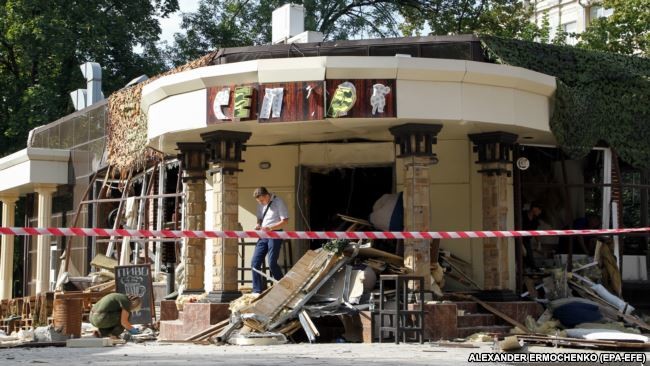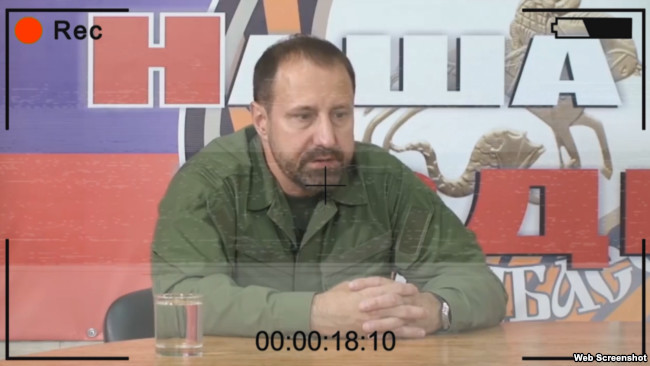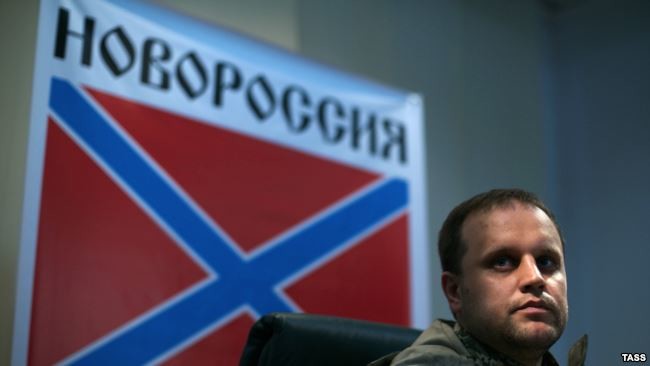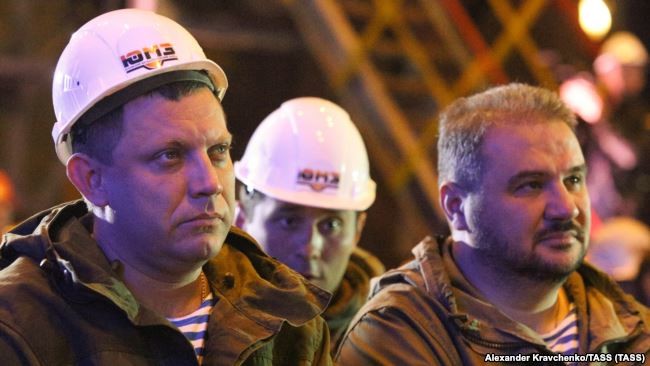Ukraine UPDATES BELOW. The so-called “Donetsk People’s Republic” (DNR) has been quietly dismantled since the assassination of DNR leader Alexander Zakharchenko last year. It has been boxed up and sent to Moscow, from which it is currently more overtly ruled.
Previous coverage of the Ukraine conflict can be found here.
An Invasion By Any Other Name: The Kremlin’s Dirty War in Ukraine
Donetsk, January 2019
By Dmitry Kirillov, Radio Svoboda
Changes in Donbass: Orders to Forget the “Russian Spring”
The following is a translation of an article that appeared on the web site of Radio Svoboda, the Russian-language service of the US-funded Radio Liberty/Radio Free Europe —The Interpreter.
Donetsk has seen in the year 2019 with yet another rulers’ coup. Nobody bothers anymore to paint a symbolic picture of a local “faction for negotiations with Ukraine.” The civilian curators [a Russian term for managers often associated with intelligence – The Interpreter] don’t hide in the shadows now – key ruling positions are once again held by citizens of Russian. The local “heroes of 2014” aren’t just pushed into the background; they are totally abandoned to political oblivion for inconvenience – without a mandate, without pay, without honor.
This situation took shape in November-December 2018, and analysts connect it not with the aftermath of the assassination of Alexander Zakharchenko [leader of the so-called “Donetsk People’s Republic or DNR–The Interpreter], but with the destruction of the pro-Russian flank in Ukrainian politics. The declared unification of the opposition around the figure of [Ukrainian oligarch and politician] Viktor Medvedchuk, with the prospect of creating a powerful, united faction in a future Ukrainian parliament, failed with a crash. And this process demonstrates that in Moscow, no one expects compromises any longer within the framework of the Minsk agreement.
Portraits No Longer Needed
For people in Donetsk, the statement, “You haven’t changed in five years!” is like an insult. In five years, the territories not controlled by Ukraine have traveled a major path from rebel lands run by what were more like armed gangs than regular formations, to extremely organized, brutally disciplined territories ruled from Russia, with strict curfews and the absence of major private business – everything valuable and major here is under covert or not-so-covert “external rule.”
“You know, they even took away the portraits of those killed!” a Radio Svoboda source among the “DNR government’s” technical workers say dejectedly.
Separ Cafe in Donetsk, after bombing that took the life of Alexander Zakharchenko.
In his life, just as in the life of many other people who have collaborated with the DNR, major changes have taken place since the day Zakharchenko was murdered. At first, a memorial was placed at the site of the former DNR’s leader’s death, which was near the Separ cafe [so named for the “separatists”]. Now, all the posters of Zakharchenko have disappeared everywhere. For many Donetsk residents, this is the chief marker of the new Donetsk era.
On the first floor of the building of the Donetsk Regional State Administration (DonOGA), which has been called “Government House” since 2014, to the left of the elevators, for four years, there has been a memorial wall adorned with paper portraits of those killed from April to August 2014, with flowers and votive candles. Far from everyone was there; the memorial was in part spontaneous and most likely conveyed the spirit of that time.
Now, this “spirit” has been removed, and the building has begun to conform to its title totally. Extraneous “Donetsk” ministries have moved or are in the process of moving to a fourth center of power – the First International Bank building at No. 2 Universitetskaya Street. Part of the DNR government occupies the Altai facility as before (the former financial department of DonOGA), and the office center at No. 7b Pushkin Street. The secretive management company called Vneshtorgservis [External Trade Service] occupies offices in a high-rise towering over the Donbass Palace Hotel, so the “government” is now seated separately.
In Donetsk, a law was even especially passed to rename the council of ministers to “the DNR government”; vice premiers are now called “deputy chairs” [zampreds]. The most secretive floor of Government House is occupied by the offices of Alexander Ananchenko, the secret prime minister of the DNR, who is from Russia.
As before, nothing is known about Ananchenko except that he has a higher education. It is forbidden to photograph the head of the DNR government, or his personal guard – which contains not a single local. Only the zampreds – Igor Martynov and Vladimir Antonov are permitted to enter his half of the floor. There are also no photographs of Ananchenko on the official government site.
Under Zakharchenko, the “council of ministers” had not met for nearly a year; he had taken up the head of the DNR immediately, and there was no separate ruling center in the form of a “government.” Now, the majority of cash flows and powers are concentrated in fact under the little-known bureaucrat Alexander Ananchenko. The DNR government, according to Radio Svoboda sources in Moscow, is a creature of Vice Premier Dmitry Kozak; the “political line” continues to be run by Vladislav Surkov, aide to Vladimir Putin, but the “political field” itself in Donetsk is now narrowed to the extreme – under the new DNR chief Denis Pushilin, there are no armed formations and economic assets, so essentially his role is purely formal.
Screen shot of video of Alexander Khodakovsky.
A year ago, the picture at the DNR was reminiscent of a complex mosaic. First, Alexander Khodakovsky, the former commander of the Vostok Brigade, was then restoring his influence. His Patriotic Forces of Donbass civic movement was not represented at all in the Popular Council, but it had its network of cells. Khodakovsky loudly demanded the holding of competitive elections and – what is very important under DNR conditions – demanded this along with exposing Zakharchenko’s corruption, with complete impunity.
Secondly, Zakharchenko himself formed his own personal faction and civic movement called “Oplot Donbassa” [Donbass Bastion] out of veterans of his own battalion, and gradually promoted Alexander Kostenko, his former personal guard and head of that faction as the future replacement of Denis Pushilin for the position of head of the Popular Council. There was also an official ruling organization, “Donetsk Republic,” under Zakharchenko, into which all the employees of the budget sector were compulsorily incorporated.
Thirdly, there was an organization called “Svobodny Donbass” [Free Donbass] run by the couple Pavel Gubarev [once known as the “people’s governor of Donetsk”] and his wife, Yekaterina, with its economic base and holding with the general name “Novorossiya,” made up of seven media companies – ranging from a television channel to a news agency to a newspaper.
Finally, Boris Litvinov, the head of the relatively prohibited DNR Communist Party (there are no political parties in the DNR, only civic movements), had, nevertheless, an office at Government House and at any moment could plug his organization into any political campaign.
In a word, at the first go, all of these relatively autonomous movements and organizations could have organized such competitive elections for show, without Ukrainian candidates and parties, to make any OSCE observers’ heads spin.
So, what has happened in the last two months? Alexander Khodakovsky now lives in Russia – he’s not allowed into Donetsk. “Regrettably, my hopes of returning home before New Year’s and managing to see my relatives this year was destined not to be realized,” he complained on his Telegram channel.
The only thing to remind us of Donbass Bastion is an enormous banner, torn in places, with the slogan, “There is nothing more sacred than the bonds of comradeship.” The movement’s site has not been updated since last October; the three most well-known members of the movement still alive – Alexander Timofeyev, Alexander Kostenko, and Sergei Zavdoveyev, former commander of the Legion Battalion, are not on the lists of deputies of the new DNR Popular Council at all. The TV channel Oplot TV [Bastion TV] has become a state enterprise and is now managed – like all the rest of the media – by the DNR Ministry of Information. There are no quotas in the government; there are no traces of the organizations; and there is no protest from the people who fought in 2014-2015.
Pavel Gubarev, with a flag of Novorossiya, literally “New Russia,” a historical term for an area of tsarist Russia north of the Black Sea, now part of Ukraine, which is still used by Russian-backed forces in the Donbass.
Pavel and Yekaterina Gubarev,
heroes of the “Russian Spring,” are now busy with organizational matters in
connection with the closure of their television channel and other media. Novorossiya,
their holding company, has huge payroll debts, and the employees of the
television channel have been working without contract as “volunteers”. The
complicated management body of the television channel has been transferred to
the rank of a state enterprise and by decision of the government is now closed.
Free Donbass, the civic organization, has been seized from the Gubarevs, and
they have not been allowed into the Popular Council; no public protests from
them have been heard since last October. Radio Svoboda was unable to learn whether
the Gubarevs still maintain influence over a network of Semyorochka
supermarkets in Donetsk, but at least one source close to the DNR government
reported that Communications Minister Viktor Yatsenko, “the Gubarevs’ man,” may
lose his seat in the coming weeks.
No seat in the DNR Popular
Council was found, either, for the Communist Boris Litvinov, former speaker.
Litvinov and his organizations had performed invaluable service to the
organizers of the “Russian Spring” – during the May 11, 2014 referendum, there
were many of Litvinov’s people in the electoral commissions.
On the other hand, another Communist –
Vladimir Bidyovka, a deputy of the VII Verkhovna Rada [parliament] of Ukraine –
now heads the new Popular Council. He worked in his faction in Kiev right up
until the dissolution of the parliament by Petro Poroshenko’s Decree of August 25,
2014, and then later, when his term in office ran out, he moved to Donetsk.
Denis Pushilin, the current head of the DNR, was also absent from Donetsk
during its most difficult period, from June to October of 2014. Deputy Chairman
Igor Martynov, the highest-ranking official in the government from among the
locals, also has had no public or military merits with the young republic,
either.
All of the local, public heroes with a history
of participation in civic protests or the military actions of 2014 have not just
been removed to the reserves; they have been completely eliminated from the
political field as inconvenient.
Meanwhile, all the “heroes”
have demonstrated once again to their curators their discipline and absence of
conflict. “I really don’t understand where Kostenko disappeared to” (a deputy who headed the Donetsk Republic
parliamentary faction—RS); what Zavdoveyev is doing now (he headed Donbass Bastion—RS); they say
Yekaterina Gubareva was received several times by Antonov (DNR minister—RS) as she was winding up matters, but their political
career was also wound up here, that’s it!” a puzzled source in the DNR Popular
Council told RS.
Alexander Khodakovsky is the
last one to conduct any public activity, but it is emphatically loyal to the
interests of the curators from Russia. “Today I have endorsed the appeal to
Vladimir Putin which has come from circles close to the Kremlin about the
initiative to exchange prisoners of war. Perhaps it has fortuitously appeared
just when the fate of the detained
sailors had to be decided. They believe themselves to be prisoners of war,
in fact? So let’s exchange them for ours – enough killing our guys in prisons,”
wrote
Khodakovsky before New Year’s Day, about a letter that a number of journalists
from Russian patriotic circles had signed along with him.
Before the team from “circles near the Kremlin”
appeared, concern about the fate of “our guys” in Ukrainian prisons was
untimely and didn’t publicly worry anyone in particular.
Donetsk is now entering 2019
after the latest scuffle – everything looks as if there will no longer be any implementation
of Minsk-2 for the Donbass, and therefore it has become entirely unnecessary to
create even a virtual “faction for negotiations with Ukraine” out of locals, or
to keep even symbolic posts of people from Donetsk who believe, like
Khodakovsky, in a separate “people of Donbass” and its special interests.
This may indicate that the Donbass may soon
expect both an escalation of the war, and that a “Trojan Horse” for Ukraine is
no longer being built, due to the hopeless situation on the foreign policy
front. Instead, they have settled for building a typical Russian region like
Pskov, even if somewhat impoverished.
Even Avoska
Has Been Nationalized
After the murder of Zakharchenko, his entire
legacy was transferred to “external control.” “In accordance with a law passed,
his widow Natalya and their children are now maintained by the state, but
everything that he controlled has been seized,” a source close to the DNR
Popular Council told RS. Zakharchenko’s assets were transferred to the control
of the new zampredy [deputy chairmen].
“Of his key holdings, the Shakhtyorsk Poultry Farm is now under Martynov, and
Antonov controls the wholesale and retail sale of fuel,” said the source.
Alexander Zakharcheko (L) with Alexander Timofeyev (R).
“Every week, the list grows of property put under Igor Martynov over the telephone – a paint and varnish factory in Gorlovka; a poultry farm in Shakhtyorsk; deliveries of scrap metal…,” another source enumerates. He was a manager in the Donbass; now he lives in Moscow. “Even so, Alexander Timofeyev (known as ‘Tashkent’) has preserved his economic positions, chief of which is control over the production of counterfeit cigarettes in factories in Donetsk and Debaltsevo, and their sale and smuggling to Russia,” said the source.
The assets of Timofeyev, a friend and comrade of the late Zakharchenko, are rather public – several Donetsk entrepreneurs confirmed to RS that the local retail trade regularly receives “American” cigarettes and turn over the profits to Tashkent’s people. The Alkomarket chain of stores is also running, through which, among other things, the production from local vodka plants is sold, is also connected to Tashkent.
The windows of the office of the Vneshtorgservis company, which has taken under control the lion’s share of Donbass industry, continue to burn bright at night. Last fall, the DNR government transferred the Dokuchayevsk flux dolomite plant to the company for “external management.” But even so, some of the assets remained under the external control of Ananchenko’s organization – for example the Zasyadko and Komsomolets Donbassa liquid coal mines. Furthermore, Vladislav Brig, a deputy of the DNR Popular Council announced before New Year’s Day the start of nationalization by the local government of the Obzhor [Gourmand] and Avoska [Just-in-Case Bag] chains of stores. So Ananchenko has something else to manage.
It looks as if the “Lugansk Democratic People’s Republic” [LDNR] can also expect its own revolution in the economic sphere. Dmitry Kozak, another DNR bureaucrat who fled to Moscow, as well as a source close to the DNR government in Donetsk, claim that a re-organization of the Vneshtorgservis company, which manages all the major industrial assets of the LDNR, is being prepared, and the former Ukrainian oligarch Sergei Kurchenko is being removed from management. So, changes should be expected in Lugansk as well in the next half year, they maintain.
Translated by Catherine A. Fitzpatrick




